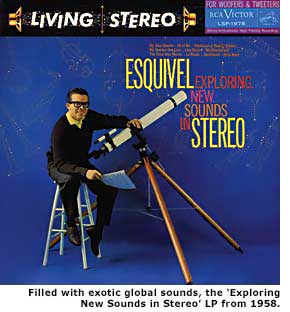Soundtrack for Modern Living: Esquivel in Orbit - Page 3
Among those flipping through the record store bins of L.A. in that era was a young animator named Byron Werner. "I was purposely seeking out optimistic music," he says, "because [rock] music in the '70s was getting pretty cynical, and everyone's hipness was getting in the way of their fun level." Cruising back in time a couple of decades to the so-called space age, Werner found not only Esquivel but other proponents of what was sometimes called 'exotica,' a subgenre of what was later collectively dubbed 'lounge music.' Werner's discoveries included Martin Denny (of 'Quiet Village' fame), Les Baxter, Bob Thompson, and Henri Rene.
Werner assembled a tape compilation of his discoveries, for which he coined the phrase 'space-age bachelor pad music.' He began sharing his tapes with fellow animators, including Zap Comix veteran Robert Williams and future 'Simpsons' creator Matt Groening, as well as with other members of a light-hearted assemblage of fanciful thinkers who called themselves the 'Church of the SubGenius.'

Werner also personally brought a tape to 'independent freeform' radio station WFMU in Hoboken, New Jersey, where he caught the ear of volunteer deejay Irwin Chusid. "It was very impressive, it was fun, it was sparkly, it was animated, it was sophisticated, it was intriguing, it was exotic," Chusid recalls. "It had all these amazing qualities which I, up 'til then, had not associated with the genre known as easy listening music."
In Los Angeles, Werner was visited by touring Boston-based punk musician Brother Cleve (who'd reversed Esquivel's approach to stage names by eliminating his surname). Werner recognized another chance to turn on a fellow member of the Church of the SubGenius (as was Chusid) to Esquivel and easy listening. "Much to my surprise, I discovered that there was a whole other side of [easy listening] that was more psychedelic than any psychedelic music I had ever heard," testifies Cleve.
Back in Boston, Cleve became aware, in the early '90s, of the growth of a subculture that embraced retro easy listening music and exotica, along with the associated symbols of Tikis and faux Polynesia. This collection of 20-and-30-somethings gave rise to a band, Combustible Edison, and a trendy lifestyle calling itself 'The Cocktail Nation.' Oddly evocative of the Mob-managed Vegas of three decades earlier, they wore sleek retro outfits, sipped martinis, smoked little cigars, and began seeking the sounds of Henry Mancini, Martin Denny, and the harder-to-find Esquivel who, unbeknownst to Esquivel himself, was ready for a revival.
With his connections in the record business, Chusid had been shopping around the material he'd received from Werner, and he eventually turned to Bar/None, a label based nearby him in Hoboken, with the blessing of RCA, who held the rights to most of Esquivel's catalogue. To help celebrate the New York City release of the Space-Age Bachelor Pad Music CD in 1994, Chusid (who produced the album) enlisted Combustible Edison. Cleve, the band's keyboard player, quickly penned some Esquivel-style charts, and the resulting concert was covered in Rolling Stone magazine and on WABC-TV. 'Bachelor Pad Music' sold way beyond expectations, and Bar/None and RCA followed up with two more Esquivel compilations and a series of reissues of the original LP's in CD format.
Through the efforts of a curious fan, Bar/None became aware that Esquivel himself was still alive, though confined to a bed due to an old spinal injury (sustained while horsing around with Joyce in 1961), compounded by a broken hip and arthritis. Cleve was dispatched to visit the rediscovered legend and to facilitate his musical output, at his brother Sergio's house in the little town of Jiutepec, near Cuernavaca. Cleve brought MIDI equipment with him, but spent the first three days just talking with his idol and perusing archival recordings and other memorabilia.
Esquivel revealed himself to Cleve as having been a proponent of the forward-looking culture of his time. "I saw photos of his home in Beverly Hills, with the swimming pool, etcetera, and he definitely had modernist taste," says Cleve. "He had a certain amount of mid-century furniture—and I know he had a starburst clock, and the latest in transistor radios. And he drove big-finned Cadillacs. He bought a new one every year."
With a return visit to Jiutepec shortly thereafter, Cleve collaborated with Esquivel on several new compositions, a new Christmas-themed album, and reissues. Irwin Chusid also came down with an offer to manage Esquivel's business affairs, a service that had been unprovided (and mostly unneeded) for many years.




